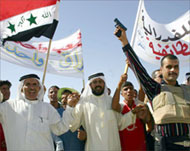Iraqi Sunnis seek anti-charter Shia ties
Iraq’s disenchanted Sunni Arabs have reached out across the sectarian divide to seek alliances with any ethnic or religious groups opposed to the newly drafted constitution.

After staging demonstrations on Monday, Sunni leaders said they were opening talks with the movement of Shia cleric Muqtada al-Sadr and preparing a national conference to generate public support for defeating the charter at a mid-October referendum.
“We would like to cooperate with Muqtada al-Sadr and very soon we will start negotiations with him,” said Salih al-Mutlaq, a top Sunni negotiator.
Al-Sadr, who rejects any constitution drafted while US-led forces remain in the country, enjoys widespread support among the poor urban Shias, and his fighters led one of post-war Iraq’s fiercest uprisings against US-led forces last year.
“It is not just about the Sunnis anymore. It is about all those who do not want Iraq to break up, including the Shia,” al-Mutlaq said.
US President George Bush said on Monday he was “very optimistic” about Iraq’s future after the charter was finally drawn up after weeks of tortuous negotiations, even if everybody had not agreed with the text of the draft.
“Now the Iraqi people get to decide, they get to debate, they get to make the decision this fall as to whether or not that constitution will be the constitution that governs their society,” he said.
Hopes dented
 |
|
Protesters have taken to the |
However, failure to win Sunni support for the charter has dented hopes that an agreement could help weaken the deadly uprising that erupted after Saddam Hussein was toppled in April 2003.
As Iraq distributed millions of copies of the charter throughout the country on Monday, thousands of Sunnis in Saddam’s hometown of Tikrit took to the streets to protest against its federalist proposals.
As well as carrying pictures of Saddam and banners calling for a united Iraq, protesters also chanted support for al-Sadr and his Shia movement.
Sunni Arabs fear any decentralisation of government will rob them of a share in Iraq’s vast oil wealth which is largely concentrated in the Kurdish north and Shia south.
During the charter negotiations, al-Sadr had expressed opposition to a federal structure for Iraq, while more senior Shia leaders called for Kurdish-style autonomous regions throughout the country.
Political allies
At least 20 members of parliament are said to be political allies of al-Sadr’s movement.
Al-Mutlaq said Sunnis would engage with leaders of any of Iraq’s mosaic of ethnic and religious groups against the charter.
“Once we have these people together, we will go for the conference which should be very soon,” he said.
A member of al-Sadr’s movement in Baghdad said: “Nothing is decided yet.
“There are several opinions but as of now we have decided to focus on registering our names to participate in the referendum. The final decision will be taken by al-Sadr later.”
Iraq’s constitution was imposed by the Kurdish and Shia blocs over the heads of Sunni representatives, and US analysts warned on Tuesday that the document fell dangerously short of US goals despite Bush’s optimism.
Fears of violence
US analysts said Sunni dissatisfaction with the constitution would probably fuel an increase in violence in the war-battered country.
|
“What we have now is a situation which is the beginning of a countdown to something that will look like civil war in Iraq” Flynt Leverett,Brookings Institution |
“It’s not a good path we are on right now,” said Flynt Leverett, of the Washington-based Brookings Institution think-tank. “You have a situation now in which one or two things will happen, and both of them are bad.”
He said either the minority Sunni Arabs would succeed in mustering a two-thirds majority in three of the country’s 18 provinces to sink the charter, or would fail and end up feeling disenfranchised and disgruntled.
Either scenario would produce a political crisis, Leverett said.
“What we have now is a situation which is the beginning of a countdown to something that will look like civil war in Iraq.”
In violence on Tuesday, five people including four security officers were killed in separate attacks throughout Iraq, police said.